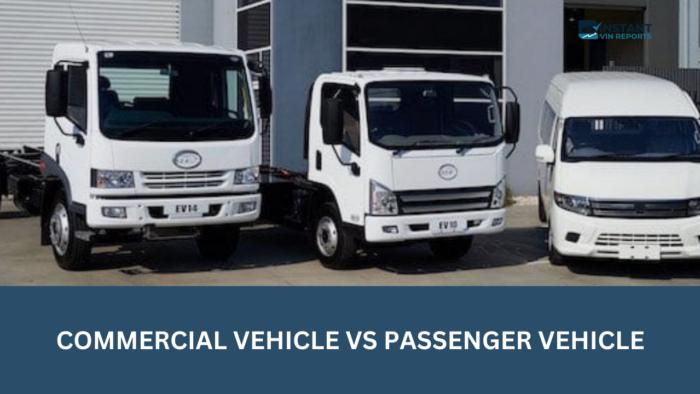Commercial vehicles differ from passenger vehicles in the sense that commercial vehicles are mostly used for carrying goods or, perhaps, fare-paying passengers. This is not usually the case with passenger vehicles; goods and passengers are only sometimes paid for.
This article will consider the significant differences between commercial and passenger vehicles, outlining vehicles predominantly used for commercial purposes and those used as passenger vehicles. Other details and information that are not mentioned here could be seen in the vehicle’s build sheet.
A commercial passenger vehicle is a motor vehicle designed for transporting passengers, with or without goods, for hire or reward during trade or business. This category includes public buses, private buses, taxis, and, in some cases, trucks authorized to carry a specified number of passengers on designated routes for a specified period.
| DID YOU KNOW? The line between commercial and passenger vehicles can blur a bit! A regular car can be considered commercial, depending on its use. For example, if you use your car for ride-sharing or deliveries, it would be classified as a commercial vehicle and require specific insurance. |
Characteristics of Commercial Vehicle
There are two main factors that define a commercial vehicle:
- Purpose: The primary function of the vehicle is for business or revenue-generating activities. This includes transporting goods, passengers, or hazardous materials.
- Weight: Some regions have a Gross Vehicle Weight Rating (GVWR) threshold. Vehicles exceeding this weight (often around 10,001 pounds) are automatically classified as commercial.
Additional features that might be present on commercial vehicles include:
- Larger cargo capacity: Trucks, vans, and trailers are designed to haul significant loads.
- Specific signage or markings: These markings identify the vehicle type and any hazardous materials it might be carrying.
- Specialized equipment: Depending on the cargo, commercial vehicles might have cranes, refrigeration units, or other task-specific features.
What Vehicles are Considered Commercial?
The following are vehicles commonly classified as commercial vehicles, however, as stated earlier, even some seemingly non-commercial vehicles may be classified as commercial depending on the purpose that they serve.
- Trucks: From delivery vans to massive semi-trucks, these vehicles are built for hauling a wide range of goods.
- Buses: Designed to transport passengers, including school buses, city buses, and tour buses.
- Taxis and Ridesharing Vehicles: Vehicles used for transporting passengers for hire.
- Delivery Vans: These enclosed vehicles are ideal for transporting packages and goods.
- Trailers: These towed units come in various configurations to haul specific cargo behind a commercial truck.
Regulations Governing Commercial Vehicles
Commercial vehicles are subject to stricter regulations than passenger vehicles due to their size, weight, and potential safety hazards. These regulations can vary by region but generally cover:
- Licensing: Drivers of commercial vehicles require specific licenses with additional training compared to regular driver’s licenses.
- Safety Inspections: Commercial vehicles undergo regular inspections to ensure they meet safety standards.
- Maintenance: Strict maintenance schedules are required to keep commercial vehicles operating safely.
- Insurance: Commercial vehicles typically require higher insurance coverage compared to passenger vehicles.
- Hours of Service (HOS): Regulations limit the number of hours a commercial vehicle driver can operate continuously to prevent fatigue.
These regulations help ensure the safety of drivers, passengers, and everyone on the road sharing it with commercial vehicles.
| DID YOU KNOW?The massive cargo ships you see traversing oceans are considered commercial vehicles too! Even though they aren’t on the road, they play a vital role in global trade, and a whole set of maritime regulations specific to commercial vessels governs their operation. |
Tips for Buying A Used Commercial or Passenger Vehicle
Here are some essential tips to follow before purchasing a used private passenger or commercial vehicle:
Pick the right model and size
Diligent research is usually rewarded with the information needed to make the right decision; researching a vehicle properly can help you determine whether it suits your needs.
For passenger vehicles, you should consider the typical number of passengers you’ll have or cargo you’ll bring along with you. Not all vehicles are made equal, some are able to bring more passengers and cargo than others. And just because a vehicle has more room, doesn’t mean it’s rated to carry more load. You can also check for reliability ratings from consumer reports Consumer Reports.
For commercial vehicles, there are more hoops to jump through in terms of regulations. You should learn the laws related to commercial vehicle in your area, including licensing requirements, weight restrictions, and safety inspections. There are also different vehicle types that will suitable for your intended purposes better. A box truck might be ideal for deliveries, while a dump truck would be better suited for construction.
Conduct a thorough vehicle inspection
Inspecting the vehicle thoroughly using one or more of the mechanisms listed below is a sure way to discover what might not be initially apparent.
- Schedule an Inspection: Take the vehicle to a trusted mechanic for a pre-purchase inspection. This will identify any potential problems and repair costs.
- Check the Vehicle History: Use a vehicle history report service to uncover the vehicle’s past accidents, repairs, ownership changes, and mileage accuracy.
- Test Drive: Take the vehicle for a thorough test drive. Pay attention to handling, braking, and any warning lights on the dashboard.
Double check the legitimacy of the paperwork
This is one of the most essential actions to take, as it ensures peace of mind; hence, implement one or more of the suggestions outlined below.
- Title: Ensure the seller has a clean title and the vehicle identification number (VIN) matches the paperwork.
- Registration: Verify the vehicle registration is current and up-to-date.
- Maintenance Records: If available, ask for the vehicle’s maintenance records to assess its upkeep history.
Negotiate for fair price
After doing your research, you could find that some things are either in or out of place; this knowledge will help you decide how to negotiate; actual market value is the primary thing you should research.
- Research Market Value: Use online resources to determine the fair market value of the vehicle based on its year, make, model, mileage, and condition. This will help you negotiate a fair price with the seller.
Additional tips for purchasing a used vehicle
The following tips might also be helpful; consider considering them as part of your evaluation process.
- Beware of Scams: Be cautious of deals that seem too good to be true. Verify all information and avoid sending money upfront without a proper inspection.
- Consider Financing: If financing the vehicle, shop for the best loan rates from banks or credit unions.
- Factor in Insurance Costs: Get quotes from insurance companies to understand the insurance cost associated with the specific vehicle.
Closing Thoughts
By following these tips, you can increase your chances of finding a reliable used vehicle at a fair price, whether it’s for personal or commercial use. Always keep in mind that a complete vehicle history is essential in the decision-making process of buying and selling used vehicles.
Frequently Asked Questions
What Makes a Pickup Truck Commercial?
Regular pickup trucks are not inherently commercial vehicles. They are typically classified for personal use. However, if a pickup truck is used for commercial purposes, such as construction work, hauling equipment, or deliveries, it would be considered a commercial vehicle and subject to different regulations and insurance requirements.
Is an SUV a Commercial Vehicle?
Similar to pickup trucks, SUVs are generally not commercial vehicles. They are designed for personal transportation. However, if an SUV is used for commercial purposes, like ride-sharing or deliveries, it would be classified as a commercial vehicle. So, what are you doing with your SUV? Is it serving a commercial purpose?
Is a Government Vehicle Considered a Commercial Vehicle?
Government vehicles typically are not commercial vehicles. They are used for public services rather than for generating revenue. However, there can be exceptions. For instance, some government departments might operate fleets of delivery vehicles or use trucks for specific tasks. In those cases, the specific vehicles used for commercial purposes would be subject to commercial vehicle regulations.










